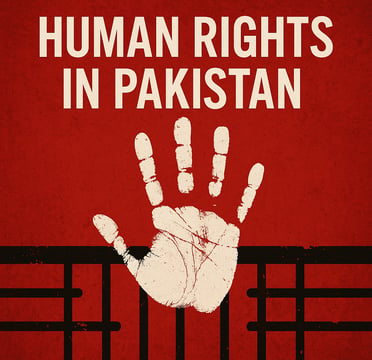
Human Rights Crisis in Pakistan 2025 – Suppression, Censorship & Resistance
In 2025, Pakistan is witnessing one of its darkest chapters in human rights history. From political suppression and censorship to enforced disappearances and media blackouts, this blog exposes the systemic violations happening across the country and calls for urgent action by citizens, the diaspora, and the international community.
DEMOCRACY & HUMAN RIGHTS – PAKISTAN
5/17/20253 min read


The Erosion of Rights
In 2025, Pakistan stands at a human rights crossroads. Once envisioned as a democratic republic that would protect freedom, dignity, and justice for all, the country has instead become a case study in the steady erosion of civil liberties.
From journalists behind bars and political leaders silenced to enforced disappearances and internet blackouts, the state of human rights in Pakistan is alarming, systemic, and worsening.
This blog post explores the ongoing human rights crisis — who it affects, how it’s happening, and why it must matter to every Pakistani and global citizen.
Political Repression: Democracy in Name, Autocracy in Practice
Since the removal of Imran Khan’s elected government in 2022, Pakistan has experienced an authoritarian slide masquerading as democracy.
Key violations include:
Mass arrests of political workers, many without warrants or due process.
Military trials for civilians, in violation of Pakistan’s constitution.
Restrictions on public protests, including blanket bans and violent crackdowns.
Bans on political party symbols, colors, or even the display of certain leaders’ photos — especially PTI and Imran Khan.
Political opposition has effectively been criminalized — with party members surveilled, harassed, or forced into exile or silence.
Judiciary Under Pressure
Pakistan's judiciary is no longer perceived as independent. The following trends have emerged:
Selective justice based on political alignment
Judges intimidated, transferred, or dismissed if their rulings challenge the establishment
Cases against government critics fast-tracked, while petitions on fundamental rights are delayed or ignored
Courts have increasingly appeared complicit in the erosion of democratic rights — enabling, rather than checking, executive overreach.
Censorship and Media Crackdowns
Freedom of expression — the bedrock of any democracy — is under direct assault.
The media environment in 2025 includes:
Bans on coverage of certain politicians and events
Journalists threatened, abducted, or arrested, including top anchors and YouTubers
Complete internet shutdowns during political events or protests
YouTube channels and social media accounts suspended under state pressure
Foreign media barred from freely reporting inside Pakistan
The result is an information vacuum, where truth is replaced with state-sponsored narratives, and dissent is labeled treason.
Enforced Disappearances and Torture
Enforced disappearances — once concentrated in Balochistan — have spread to all parts of the country, targeting:
Political workers
Student activists
Journalists
Human rights defenders
Even ordinary citizens who post on social media
Detainees are often held without charge, denied legal access, and subjected to psychological or physical torture. Many are later released without explanation. Others are never seen again.
The Commission of Inquiry on Enforced Disappearances remains toothless, and families of the missing are denied both justice and closure.
Suppression of Civil Society and NGOs
The government has systematically targeted civil society:
Revoking licenses of NGOs, especially those focused on human rights or democracy
Blocking foreign funding, especially from international watchdogs and rights groups
Surveillance and raids on human rights organizations
This crackdown has severely hampered education campaigns, legal aid services, and human development initiatives, particularly for women and minorities.
Women and Minorities: Double Discrimination
Human rights violations are especially severe for:
Women:
Survivors of harassment or assault rarely see justice.
Female activists and journalists face death threats and online abuse.
Representation in politics and decision-making remains tokenistic.
Religious Minorities:
Blasphemy laws are routinely used to harass Christians, Hindus, and Ahmadi Muslims.
Houses of worship are attacked with impunity.
Minority representation in public office is virtually non-existent.
International Silence and Diaspora Advocacy
While international human rights groups like Amnesty International and Human Rights Watch have documented these abuses, governments remain largely silent — choosing strategic interests over human rights.
However, the Pakistani diaspora is speaking out — organizing protests, filing petitions, and lobbying lawmakers in the U.S., U.K., Canada, and Europe.
Platforms like VOPA (Voice of Pakistani Americans) are now amplifying the cries for justice from within Pakistan.
Conclusion: A Call to Conscience
Pakistan’s human rights crisis is no longer hidden — it is visible, documented, and deliberate.
The question is no longer whether violations are occurring. The question is:
“Who will stop it, and when?”
If courts will not protect the people,
If parliament is powerless,
If media cannot speak,
And if international allies remain silent...
Then the responsibility falls on the people — at home and abroad — to resist, expose, and rebuild a just society.
"You cannot silence an entire nation forever. Justice may be delayed — but never defeated."
Disclaimer
This article is based on publicly available news sources and independent human rights reports. It is intended for informational and educational purposes only. The analysis herein does not allege or imply criminal misconduct by any individual. Interpretations are made in good faith to support public awareness, democratic discourse, and policy reflection.
Voice of Pakistani Americans
TOGETHER WE CAN DO IT!
Support
© 2025. All rights reserved.


